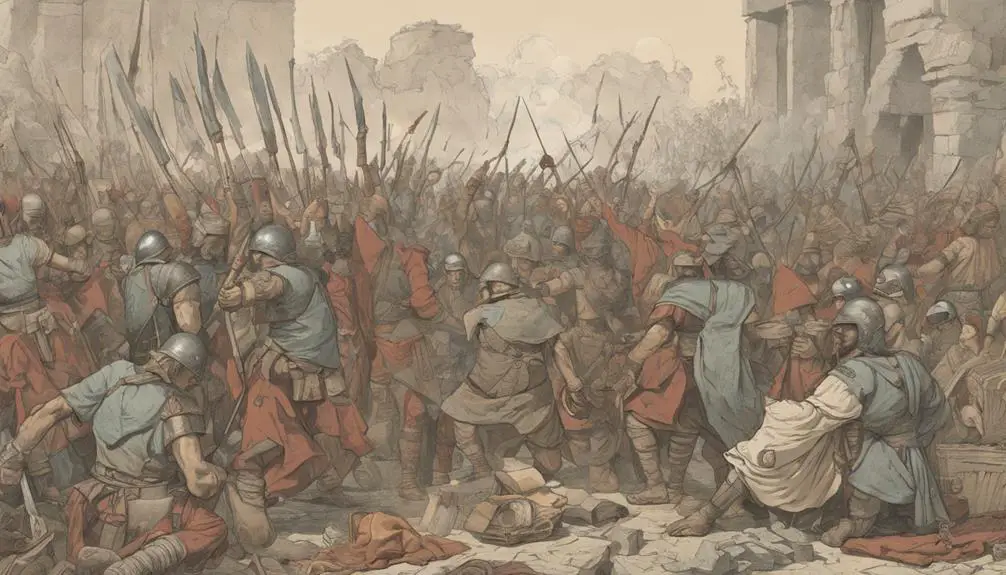This exploration of plunder in the Bible uncovers divine justice and morality, inviting a deeper understanding of ancient narratives and their modern implications.

What Is Plunder in the Bible
As you navigate the winding roads of biblical history, you'll find that plunder isn't just a footnote; it's a treasure trove that reveals much about the era's socio-economic and divine interactions.
In the Bible, plunder often straddles the line between divine reward and punitive retribution, offering a unique lens through which to view justice, morality, and the consequences of human action.
By understanding the instances and implications of plunder, you'll uncover layers of meaning that could reshape how you see ancient narratives and their relevance today.
So, let the journey begin and see where this path might lead you in comprehending the complexities of biblical texts.
Key Takeaways
- Plunder in the Bible refers to goods forcibly taken during warfare, often seen as divine judgment or favor.
- It is deeply intertwined with ethical and theological discussions, highlighting the complexities of war and divine commandments.
- Biblical narratives offer instances where plunder is sanctioned by divine will, presenting moral challenges to understanding divine justice.
- Modern interpretations focus on the ethical implications of plunder, encouraging contemporary reflection on historical and spiritual contexts.
Defining Biblical Plunder

In biblical contexts, 'plunder' often refers to the goods or wealth forcibly taken from a vanquished party, typically during or after a conflict, embodying both a tangible asset and a symbol of divine favor or judgment. The concept's origins trace back to ancient practices where victors claimed the spoils of war as a right, intertwining with notions of divine providence or retribution. This framework not only justified the act of plundering but also codified it within the moral and legal codes of the time.
The evolution of language around the term 'plunder' in biblical narratives reflects these complex underpinnings. Initially rooted in physical acts of seizure and appropriation, its connotations expanded to include the imposition of divine will. As such, 'plunder' in the Bible is multifaceted, encapsulating both the act of taking and the divine endorsement or condemnation that accompanies it.
This delineation underscores the intricate relationship between divine will and human action within biblical stories, where plunder serves as both a narrative device and a theological concept. By examining the origins and language evolution of 'plunder,' one gains insight into the broader cultural and religious contexts that shaped these narratives, offering a deeper understanding of their enduring significance.
Historical Instances of Plunder
Understanding the conceptual framework of 'plunder' in biblical narratives sets the stage for examining specific historical instances where this practice was vividly enacted. In these stories, victorious armies often claimed war spoils from defeated foes, a common yet complex aspect of ancient warfare and culture.
Here are three notable examples:
- The Battle of Jericho: As depicted in the Book of Joshua, the Israelites' capture of Jericho represents one of the earliest and most striking instances of plunder. Following divine instructions, they devoted the city to destruction, taking only specified items as war spoils.
- The Amalekite Confrontation: In 1 Samuel, Saul's failure to fully execute God's command to annihilate the Amalekites and seize their goods as plunder highlights the nuanced role of plunder within divine directives and the consequences of disobedience.
- The Spoils of the Midianites: Numbers 31 recounts Moses commanding the Israelite soldiers to take the Midianites' possessions, livestock, and women as plunder. This not only illustrates the practice of plunder but also its regulation under specific divine commands.
These instances shed light on how victorious armies utilized war spoils, intertwining divine instruction with the material benefits of conquest.
Theological Implications

Exploring the theological implications of plunder in biblical narratives reveals how divine commands intersect with human actions during warfare. You'll find that ethical considerations are deeply woven into these accounts, challenging readers to ponder the righteousness of war and the morality of seizing goods. This analysis uncovers a complex layer where spiritual consequences of such actions are scrutinized under the divine law.
The act of plunder, while often seen as a spoil of war, carries with it a heavy ethical weight. You're invited to consider not just the immediate benefits but the long-term spiritual ramifications. Does the act align with the broader moral and ethical teachings of the Bible, or does it stand in stark contrast? These narratives prompt you to question how adherence or deviation from divine commandments during times of conflict can lead to profound spiritual consequences.
Furthermore, the biblical treatment of plunder serves as a mirror, reflecting the ethical dilemmas and spiritual trials faced by those in the narratives. It's a reminder that actions, especially those in the heat of conflict, aren't just about physical outcomes but about their alignment with divine will and their impact on one's spiritual journey.
Plunder and Divine Justice
When considering the biblical accounts of plunder, it's crucial to examine how these actions align or conflict with divine justice. The narrative of plunder, as seen in various biblical texts, presents a complex interplay between divine commandments and human actions, often leading to significant ethical dilemmas.
Here are three critical points to consider:
- Divine Sanction of Plunder: In some instances, the Bible depicts plunder as divinely sanctioned, particularly as war spoils awarded to the victors. This inclusion suggests a form of divine justice where plunder serves as both a reward for obedience and a tool for executing divine judgment.
- Ethical Dilemmas: The act of taking war spoils raises ethical questions, especially when considering the impact on the defeated. The biblical text doesn't shy away from these dilemmas, instead presenting them as part of the complex moral fabric of ancient societies.
- Human Interpretation and Action: The execution of divine commands involving plunder was subject to human interpretation. This aspect underscores the responsibility placed on individuals and communities to discern and implement divine will, balancing the pursuit of justice with mercy and ethical considerations.
Modern Interpretations

Reflecting on ancient narratives, it's essential to consider how contemporary scholars interpret the biblical accounts of plunder in light of modern ethical frameworks. You'll find that these interpretations often highlight the ethical dilemmas inherent in these stories, emphasizing the complexities of moral decision-making in times of conflict and war. Scholars argue that understanding these accounts through a modern lens can shed light on the societal impact of such actions, both historically and in contemporary contexts.
As you delve deeper, you'll notice a shift in focus towards the consequences of plunder on communities and individuals. This analysis doesn't just stay within the confines of historical or theological study; it extends into discussions on human rights and international law. The aim is to understand not only the motivations behind such actions but also their long-term effects on societies.
This scholarly approach encourages you to see beyond the surface of these ancient stories. It challenges you to think critically about the ethical implications of plunder and its relevance today. By examining these biblical narratives through a contemporary ethical lens, you're invited to engage with them in a way that considers both their historical context and their ongoing societal impact.
Frequently Asked Questions
How Has the Concept of Plunder in the Bible Influenced Modern Laws Regarding Looting and Property Rights?
You're looking at how ancient concepts of plunder have shaped modern laws on looting and property rights. Legal precedents often draw on historical and biblical notions of plunder to establish frameworks that govern property rights today.
Ethical considerations, influenced by biblical narratives, also play a crucial role in shaping laws against looting. This blend of historical insights and ethical norms has significantly influenced contemporary legal systems, ensuring a just treatment of property rights.
In What Ways Have Different Christian Denominations Interpreted the Moral Lessons Surrounding Biblical Stories of Plunder Differently?
Different Christian denominations have interpreted the moral lessons on biblical stories of plunder through varied lenses. They focus on divine commands and ethical dilemmas. Some view plunder under divine commands as morally justified, while others question the ethical implications, pondering the morality of such actions. This divergence reflects a broader debate on interpreting scripture. Context and theological perspective deeply influence the understanding of morality and divine will.
Are There Any Biblical Figures Who Are Celebrated or Criticized Specifically for Their Role in Acts of Plunder?
Yes, there are biblical figures both celebrated and criticized for their roles in acts of plunder. These narratives often reflect divine commands and are fraught with moral ambiguity.
For instance, Joshua's conquest of Jericho involves divinely sanctioned plunder, while Achan's unauthorized taking of spoils leads to his downfall.
Such stories prompt you to explore the complex interplay between divine directives and human actions, challenging you to discern the moral lessons embedded within.
How Does the Concept of Plunder in the Bible Compare to Similar Concepts in Other Religious Texts, Such as the Quran or the Bhagavad Gita?
When comparing the concept of plunder across religious texts like the Quran and the Bhagavad Gita to that in the Bible, you'll notice each tradition addresses the issue through the lens of divine commandments and ethical dilemmas.
These texts often provide nuanced interpretations of what constitutes justifiable acts of plunder, reflecting broader theological and moral frameworks.
Your understanding deepens by analyzing how each faith integrates these actions within their ethical teachings.
Can the Act of Plundering in Biblical Times Be Seen as a Form of Economic Redistribution, and How Does This View Conflict or Align With Contemporary Economic Theories?
You're exploring whether biblical plunder can be viewed as a form of economic redistribution. This perspective raises questions about economic morality and redistribution ethics.
It's crucial to analyze how this interpretation aligns or conflicts with contemporary economic theories. While some may argue it's a primitive form of wealth reallocation, others might see it as fundamentally at odds with modern principles of fairness and equity in economic practices.
Conclusion
In sum, the concept of plunder in the Bible isn't merely an ancient relic but a mirror reflecting the tumultuous interplay of divine justice and human ambition. It serves as an epic saga, where celestial decrees meet earthly desires in a cosmic ballet.
Through its historical narratives and theological nuances, biblical plunder transcends mere material gain, embodying a divine lesson in morality and justice. Its interpretation, rich in scholarly analysis, continues to evolve, offering endless fodder for the intellectually curious.



Sign up